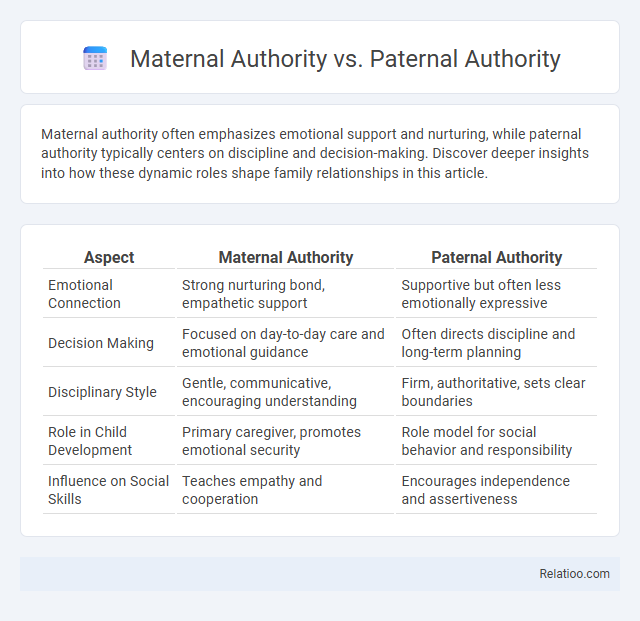Maternal authority often emphasizes emotional support and nurturing, while paternal authority typically centers on discipline and decision-making. Discover deeper insights into how these dynamic roles shape family relationships in this article.
Table of Comparison
| Aspect | Maternal Authority | Paternal Authority |
|---|---|---|
| Emotional Connection | Strong nurturing bond, empathetic support | Supportive but often less emotionally expressive |
| Decision Making | Focused on day-to-day care and emotional guidance | Often directs discipline and long-term planning |
| Disciplinary Style | Gentle, communicative, encouraging understanding | Firm, authoritative, sets clear boundaries |
| Role in Child Development | Primary caregiver, promotes emotional security | Role model for social behavior and responsibility |
| Influence on Social Skills | Teaches empathy and cooperation | Encourages independence and assertiveness |
Defining Maternal and Paternal Authority
Maternal authority refers to the rights and responsibilities a mother holds over her child, including nurturing, decision-making, and legal guardianship. Paternal authority encompasses the father's role in providing guidance, protection, and legal duties toward the child. Your understanding of parental authority combines both maternal and paternal roles, emphasizing shared responsibility for the child's welfare and upbringing.
Historical Perspectives on Parental Authority
Historical perspectives on parental authority reveal significant shifts in the balance between maternal authority, paternal authority, and joint parental authority. In many traditional societies, paternal authority dominated legal and social domains, reflecting patriarchal structures that prioritized the father's control over family decisions and inheritance. Over time, especially with the rise of feminist movements and changes in family law, parental authority evolved towards more egalitarian models emphasizing shared rights and responsibilities between mothers and fathers.
Cultural Variations in Maternal vs Paternal Roles
Cultural variations significantly influence maternal and paternal authority, with many societies assigning caregiving and emotional roles primarily to mothers, while fathers often assume disciplinary and financial responsibilities. Your understanding of parental authority should consider these culturally embedded role distinctions, which shape expectations and behavior within families. Parental authority, encompassing both maternal and paternal roles, varies widely, reflecting diverse traditions and social norms that impact family dynamics worldwide.
Psychological Impact of Maternal Authority
Maternal authority significantly influences the psychological development of children by fostering emotional security and nurturing self-esteem through consistent care and empathy. Research indicates that children with strong maternal bonds exhibit better emotional regulation and social competence, highlighting the critical role mothers play in early cognitive and affective growth. Understanding your child's needs within the framework of maternal authority can enhance their psychological resilience and overall well-being.
Influence of Paternal Authority on Child Development
Paternal authority significantly shapes child development by fostering discipline, confidence, and social skills through consistent guidance and emotional support. Your child's cognitive and emotional growth benefits from a balanced paternal presence that complements maternal care, promoting resilience and positive behavior. Effective paternal involvement enhances problem-solving abilities and self-esteem, contributing to overall well-being and success in adulthood.
Authority Styles: Warmth vs Discipline
Maternal authority traditionally emphasizes warmth and nurturing, fostering emotional connection and support, while paternal authority often leans towards discipline and structure, reinforcing boundaries and rules. Parental authority combines both styles, aiming for a balanced approach that integrates warmth with consistent discipline to promote healthy child development. Research shows that authoritative parenting, characterized by high warmth and firm discipline, tends to result in better social and cognitive outcomes compared to authoritarian or permissive styles.
Shifting Dynamics in Modern Families
Shifting dynamics in modern families have redefined maternal authority, paternal authority, and parental authority, emphasizing a more balanced approach to decision-making and caregiving roles. Maternal authority traditionally centered on nurturing, while paternal authority often involved discipline and provision; however, contemporary parental authority blends these roles, prioritizing collaboration and shared responsibilities. Your family structure benefits from recognizing this evolution, encouraging adaptive communication and equal partnership in parenting.
Gender Stereotypes and Parental Authority
Maternal authority often aligns with nurturing and emotional support, reinforcing traditional gender stereotypes that view mothers as primary caregivers. Paternal authority tends to emphasize discipline and decision-making, reflecting societal expectations of fathers as authoritative figures. Your understanding of parental authority must recognize that rigid gender roles can limit effective parenting, while balanced contributions from both parents promote healthier family dynamics.
Balancing Maternal and Paternal Influences
Balancing maternal and paternal influences involves integrating nurturing care typically associated with maternal authority and the discipline often linked to paternal authority, creating a comprehensive parental authority framework. Research shows that children benefit most when both parents actively share decision-making and emotional support, fostering well-rounded development and secure attachment. Effective parental authority emerges from coordinated communication and mutual respect, promoting consistency and stability in family dynamics.
Future Trends in Parental Authority
Emerging research highlights a gradual shift towards balanced parental authority, where decision-making power is increasingly shared between mothers and fathers, reflecting evolving gender roles in modern families. Future trends indicate a rise in collaborative co-parenting models supported by digital tools and legal frameworks promoting equality and child-centered approaches. This transformation aims to enhance child development outcomes by combining the strengths of both maternal and paternal influences within the parental authority structure.

Infographic: Maternal authority vs Paternal authority
 relatioo.com
relatioo.com